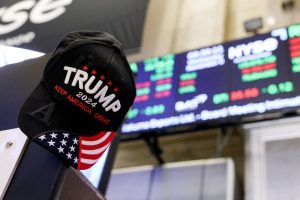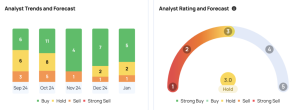
Highlighted on January 14, it was unveiled in an SEC filing that Schwab, Director at FedEx FDX, executed a significant transaction involving the exercise of company stock options.
What Happened: A Form 4 filing from the U.S. Securities and Exchange Commission on Tuesday showed that Schwab, Director at FedEx, a company in the Industrials sector, just exercised stock options worth 3,980 shares of FDX stock with an exercise price of $174.63.
The Wednesday morning update indicates FedEx shares up by 1.04%, currently priced at $280.5. At this value, Schwab’s 3,980 shares are worth $421,342.
Delving into FedEx’s Background
FedEx pioneered overnight delivery in 1973 and remains the world’s largest express package provider. In its fiscal 2024, which ended in May, FedEx derived 47% of revenue from its express division, 37% from ground, and 10% from freight, its asset-based less-than-truckload shipping segment. The remainder came from other services, including FedEx Office, which provides document production/shipping, and FedEx Logistics, which provides global forwarding. FedEx acquired Dutch parcel delivery firm TNT Express in 2016, boosting its presence across Europe. TNT was previously the fourth-largest global parcel delivery provider.
Unraveling the Financial Story of FedEx
Decline in Revenue: Over the 3 months period, FedEx faced challenges, resulting in a decline of approximately -0.89% in revenue growth as of 30 November, 2024. This signifies a reduction in the company’s top-line earnings. When compared to others in the Industrials sector, the company faces challenges, achieving a growth rate lower than the average among peers.
Key Insights into Profitability Metrics:
-
Gross Margin: The company sets a benchmark with a high gross margin of 20.84%, reflecting superior cost management and profitability compared to its peers.
-
Earnings per Share (EPS): FedEx’s EPS is significantly higher than the industry average. The company demonstrates a robust bottom-line performance with a current EPS of 3.06.
Debt Management: FedEx’s debt-to-equity ratio is notably higher than the industry average. With a ratio of 1.41, the company relies more heavily on borrowed funds, indicating a higher level of financial risk.
Navigating Market Valuation:
-
Price to Earnings (P/E) Ratio: With a lower-than-average P/E ratio of 17.73, the stock indicates an attractive valuation, potentially presenting a buying opportunity.
-
Price to Sales (P/S) Ratio: The P/S ratio of 0.78 is lower than the industry average, implying a discounted valuation for FedEx’s stock in relation to sales performance.
-
EV/EBITDA Analysis (Enterprise Value to its Earnings Before Interest, Taxes, Depreciation & Amortization): With a below-average EV/EBITDA ratio of 9.46, FedEx presents an opportunity for value investors. This lower valuation may attract investors seeking undervalued opportunities.
Market Capitalization Analysis: Above industry benchmarks, the company’s market capitalization emphasizes a noteworthy size, indicative of a strong market presence.
Now trade stocks online commission free with Charles Schwab, a trusted and complete investment firm.
The Importance of Insider Transactions
While insider transactions provide valuable information, they should be part of a broader analysis in making investment decisions.
In the realm of legality, an “insider” is defined as any officer, director, or beneficial owner holding more than ten percent of a company’s equity securities under Section 12 of the Securities Exchange Act of 1934. This includes executives in the c-suite and major hedge funds. These insiders are required to disclose their transactions through a Form 4 filing, to be submitted within two business days of the transaction.
Notably, when a company insider makes a new purchase, it is considered an indicator of their positive expectations for the stock.
Conversely, insider sells may not necessarily signal a bearish stance on the stock and can be motivated by various factors.
Deciphering Transaction Codes in Insider Filings
Surveying the realm of stock transactions, investors often give prominence to those unfolding in the open market, systematically detailed in Table I of the Form 4 filing. A P in Box 3 indicates a purchase, while S signifies a sale. Transaction code C denotes the conversion of an option, and transaction code A denotes a grant, award, or other acquisition of securities from the company.
Check Out The Full List Of FedEx’s Insider Trades.
Insider Buying Alert: Profit from C-Suite Moves
Benzinga Edge reveals every insider trade in real-time. Don’t miss the next big stock move driven by insider confidence. Unlock this ultimate sentiment indicator now. Click here for access.
This article was generated by Benzinga’s automated content engine and reviewed by an editor.
© 2025 Benzinga.com. Benzinga does not provide investment advice. All rights reserved.


